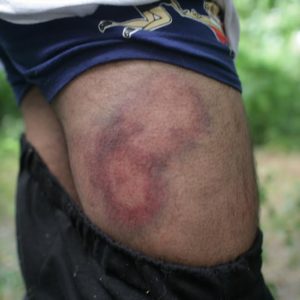On June 24th, 2017, a group of people on the move crossed into Hungary at around 10:20-10:30pm. They were approximately 5km into Hungary, when they had to cross a road to continue into the forest. As they were crossing, they saw lights. They started running away, but where apprehended. The group of people sat down together in the forrest. The interviewee describes that the apprehending officers were abusive were using swear words towards them, such as “Kurvan” (Bitch).
The Officers took them from the forest to the field and ordered them to sit in a line with their knees up and their arms around them. The officers were yelling at them and saying things like: “Where you from? Who speaks English?Afghanistan, Pakistan, Syria?” One person responded that he spoke some English, and that they were from Pakistan, and the interviewee states that in response the officers beat this person significantly. The officers released the dogs on him, 5-6 dogs, one without a muzzle and the rest with muzzles. The dog without the muzzle took the bag from the Interviewee and started to drag him. He released the bag and gave it to the dog, and the police officers proceeded to beat him with sticks and by kicking him.
The police officers that initially apprehended them were wearing blue border-police uniforms, afterwards about 10 more cars arrived, including what seemed to be army-officers. The interviewee describes that two officers in police uniforms were choosing people at random for beatings. Then, the officers ordered everyone to lay on their stomachs. First, they beat the first man in the line. The interviewee was chosen second.
“They say, “Nationality”, and first he use stick. Then, I say, “Pakistan” and they took me away separate and they released the dogs. Fikey and Taxi were their names, and they were beating me with sticks and kicks and punches. Then I was acting like I was in big pain, and they paused.”
At the same time, the officers were beating multiple other people from the group, with different kinds of sticks. The interviewee passed out from the beating, and the officers poured water on his face to wake him up, after which they kicked him again and ordered him back in the line with the others. While they were laying on their stomachs, the officers ‘ran across them’. Every officer ran across them on at a time, and the interviewee describes that the officers were laughing during this. After 30 minutes, the officers told them to “wake up”, and they took them to the road. They again made them lay on their stomachs by the side of the road. Then, they started checking their bags. The officers took one person at a time and when they finished checking their belongings, each person was told to lay back down in the line.
They stayed there for about 2 hours. While they were checking the belongings of the group of people, the officers broke their cell phones. Afterwards, they took them to a van. The group of people were transported 25-30 minutes in the van, and pushed-back. They held numbers with their ID cards, the interviewee held an ID from the Serbian camp, and the officers took 3 photos of him – from the side, face, and back.
The officers ordered one person to read aloud a paper, as speaking on behalf of the whole group, and they recorded the reading stating, “If you want to cross into Hungary, cross legally through the transit zone” and referring to specific articles. The group of people then walked to the transit camp. Afterwards HCIT and UNHCR came to take photos of them, but the interviewee states that they did not ask them any questions about what had happened, but told that medical aid would arrive. The MDM and an ambulance arrived, but the interviewee experienced that they did not have the tablets and medical supplies that people needed.

